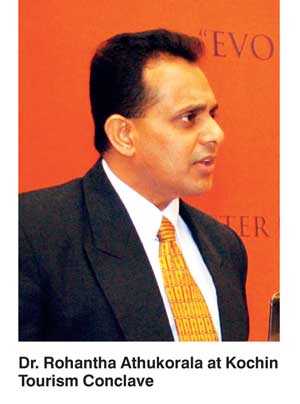Sunday Feb 22, 2026
Sunday Feb 22, 2026
Tuesday, 23 October 2018 00:00 - - {{hitsCtrl.values.hits}}
The former Chairman of Sri Lanka Tourism Dr. Rohantha Athukorala addressing a conclave evening meeting on the sidelines of the Kerala Travel Mart said: “Tourism as an industry lives on the edge anywhere in the world, be it natural disasters like floods, tsunami, etc. or manmade disasters like wars/conflict that affects the tourism equilibrium.”
“The preparedness of the industry with a strong PR plan like what we see by Kerala Tourism is a message to the world on how the industry can rebound effectively. It’s a message to the world.”
Kerala Travel Mart is India’s largest tourism sector conclave of stakeholders from around the world and attracted 395 overseas buyers and 1,095 domestic buyers having registered as participants from as many as 73 countries.
Dr. Athukorala, a former brand marketer of the power brand Dettol in the South Asian region including India, Sri Lanka and Pakistan for multinational Reckitt Benckiser, said: “Having a new TV commercial and being ready with a digital marketing campaign apart from the 25 key exhibitions that Kerala tourism industry will visit globally within this just 21 days in the key markets indicates the robustness of the marketing team which is an example to the world.”
Athukorala went on to commend how Kerala Tourism is using techniques like launching new products, namely the Malabar River Cruise Project, focusing on nine rivers in North Kerala, which are a good attention getters for the world media given that some areas had water as high as 12 feet during the flood.
“Given that Kochin Airport is fully solar driven the concept of enhancing the green cover of the state with strategies like rainwater harvesting and reduction of the use of plastic helps in the positioning of the area in the global tourism map, which is also an interesting concept that other tourism boards globally can adopt,” said Athukorala.
“You must now push the policy makers to make tourism an export industry product so that key incentives that the export industry can enjoy from a national perspective can flow to the industry, making it more competitive,” urged Athukorala, who was the seventh Chairman of the Sri Lanka Export Development when the country was stuck by the devastating tsunami in 2004.
“The industry continued to be resilient in Sri Lanka and crossed the six billion dollar mark that year which is the new skill that companies must have,” he added.